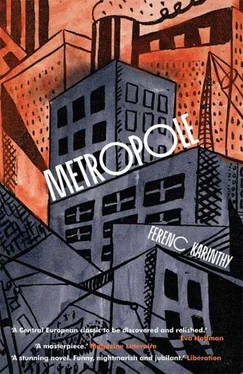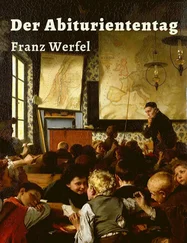He found the back door out of the abattoir and followed the line of a long ditch. He saw that the water in it was moving but the fallen leaves on its surface did not even tremble, simply sat there, muddied, in a mush of fermentation. Further along, rather surprisingly, the terrain became more urban once more: there were more buildings of a greater variety with a modern round-tower rising into the sky at one street corner. Could he have turned in the wrong direction after the metro station after all, or had he turned off at some stage and found himself back in one of the central districts from where the train had set out? Or was this an altogether different town? But would one be built so close to the first?
In front of him was a shoe shop where a young man, paralysed from the waist down, was sitting in a wheelchair and playing the violin — though he was losing track of events so fast he could not be sure later whether he had actually seen him or if he was a memory from some other, earlier occasion. The empty violin case was next to the wheelchair on the pavement. It was open and there was a note of some sort fixed to it whose meaning Budai tried to work out by considering the context. It must be an effective cry for pity since passers-by, as many here as elsewhere, were busily dropping coins into the case with even more coins lying on the ground. A considerable crowd had formed a circle round the young man, obstructing the traffic. The boy played reasonably well, handling the instrument with confidence and was probably a music student as the text might possibly have indicated. It was a strange melody he was playing, simple enough to be catchy, the phrases clear and packed, suggesting an aching desire for something, or at any rate that was how Budai interpreted it. Feeling in no particular hurry to move on he joined the ring of listeners. The young man in the meantime continued playing the same melody over and over again, his useless withered legs and shod feet dangling from the wheelchair. His face a trifle puffy, he bent his locks over the instrument and kept bowing away, ever the same tune, never looking up, ignoring everyone, his gaze empty above the violin. Might he have been blind?
Going by the audience response and the steady accumulation of offerings, he guessed the text on the case might have suggested something to the effect that the crippled young man was enrolled at a school for music and required support to help him continue his studies, studies he had had to abandon on account of a financial crisis. And whether this was merely what he imagined to be the situation or whether that was what the writing actually suggested — even though the whole thing might have been a confidence trick, one of many such played on the naïve susceptibilities of a credulous urban public — Budai still found it touching and was moved. True, he was feeling bereft himself with no idea how long he was doomed to tread the pavements of these endless streets with their acres of brick dwellings and countless inhabitants, but despite having decided to strictly limit his spending henceforth and to buy only what was absolutely necessary, he too threw a coin to the violinist.
Then he went on his way, forging on. Now he seemed to have arrived in an area that felt more central: the roads narrowed, there were traffic policemen on certain street corners, one or two older grand houses appeared and another tall fortress or ruined bastion of the kind he had seen before. He was tired with all the walking he had done by now but there was no park or bench on which he might sit and take a rest.
Seeking a resting place he entered a glazed and vaulted building complete with tower and dome, with four great clocks telling the same time on its dignified façade. Behind it stretched a vast long hall whose front and side doors were continually packed with people entering and leaving. The form of it was so familiar there must be one of these everywhere in the world. Might this be a railway station? Budai’s heart beat faster. But there were no carriages, no engines and no platforms inside that hangar-like, enormous space, roofed with a vast cloak of glass rimmed in steel. In fact, something about the sweep and movement of the crowd suggested something quite different. And yet the whole building, at least from outside, in its main features, and, examining it more closely, even in its floor plan, resembled a station to the degree that he felt obliged to consider the possibility that it might have been planned as such, and that only later was it adapted to some other purpose. What purpose that was he could not immediately tell; the wide hall full of people must have served as a general waiting room for something. To either side, right and left, opened a series of colonnaded passages full of groups of people, some standing silently, others engaged in vigorous discussion, mostly gathered near the exit doors. There was, however, nowhere to sit down.
The glazed doors led to other, smaller areas. He forced his way into one and took a peek, A dark-suited man at a table on a raised stage sat facing an audience ranged on a row of benches. Further off in a corner of this first room stood a structure that might have been a kind of pulpit where a crop-headed black woman in a blue outfit was making a speech. There were the same arrangements in the next room where the pulpit was occupied by a tall man wearing a canvas tunic uniform. At first he thought he had wandered into a school or college, that those in the pulpit were lecturers and the rest students — but if that was the case why were they sitting there in overcoats and, anyway, how could they tolerate the constant coming and going? But he was too tired by now to think about it: he opened the door to one of the rooms at random and there being an empty place at the end of the last row, he sat down.
An insignificant-looking little man in the pulpit was explaining something in a somewhat laboured manner, his eyes rapidly blinking, having to stop now and then, getting lost, clearly unused to public speaking. From time to time another dark-suited man in the front row asked him a question, as did the man sitting on the raised platform. Budai finally guessed where he was: it was obviously a court of law, one where in all likelihood, judging by circumstances, tone and atmosphere, civil cases were being tried. The man he had first taken to be a lecturer must of course be the judge and the man asking the questions some kind of barrister, while the figure in the pulpit was the plaintiff or the accused or a witness. Beyond this there was not much he could understand, the garbled language of the place being an insuperable obstacle. It was true that he was not paying much attention; the long excursion that had begun in the early morning and the endless walking had quite exhausted him. He closed his eyes for a while. He might even have fallen asleep.
He woke with a start to hear the woman next to him standing up and loudly addressing the chair. She seemed to be making some comment on the proceedings. The woman must have been there before but he had not noticed her. She was wearing thick glasses and the eyes behind them were red and swollen as if she had been crying a lot. Despite that, she was rather handsome, not above thirty or so, with a green hat perched on her blonde bun of hair, her lips finely arched, her figure, as might be expected in her state of agitation, full, tense and desirable. She had clearly been upset by something the little blinking man had stuttered, her entire face red with excitement, her mouth partly open, ready, if necessary, to intervene again. Might he have been her husband? Could these be divorce proceedings?
The barrister asked another question and the man answered unusually firmly and immediately in a single word. That was when all hell broke loose. There was muttering in court and an elderly woman in the front row sprang to her feet waving her umbrella. Soon everyone was shouting. The judge started ringing his bell but it was not enough to staunch the flood of passion. Budai’s neighbour began to sob and an old grey man with a Kaiser Wilhelm moustache turned pathetically to the chair pointing to the woman. Uniformed guards and clerks appeared and tried to calm the situation, ushering people back to their seats, the judge continuing to ring his bell. At this point the woman in the green hat — no doubt one of those most touched by the case — pushed her way past him to the pulpit and threw herself at the man currently testifying. He clumsily tried to free himself from her. The woman staggered and cried out in pain. Now it was all fury. It was the insignificant-looking little man who looked most frightened, blinking in panic, making a grab for the woman, the expression on his face so anxious and tender it seemed quite out of character.
Читать дальше












